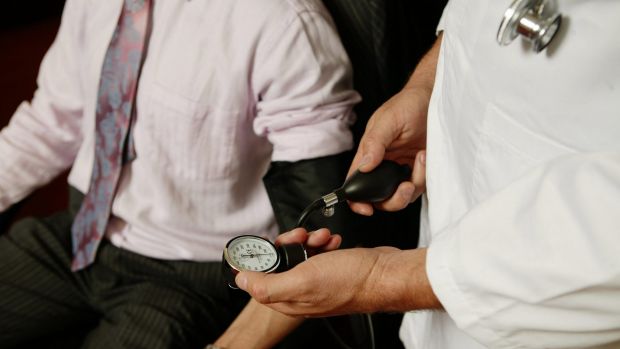
Primary prevention: A GP takes a patient’s blood pressure. Photo: Andrew Quilty
At 8am on Monday, in hospitals from Wagga Wagga to Sydney to Lismore, 969 new doctors will be born. We baby doctors comprise this fertile state’s newest crop of interns – the largest in the country and the most in NSW’s history. We are grateful for the public’s trust, and also for Tony Abbott’s decision while he was health minister to increase the number of medical school places, allowing many more of us to realise a dream of caring for our fellow citizens’ health.
After already spending up to six years at medical school, plus this coming year of internship, deciding on a speciality will be our next big decision.
“Are you going to specialise, or just be a GP?” is a question I am often asked, but it hasn’t been possible to “just be a GP” for two decades. Once, the internship was the only impediment to a new doctor hanging his or her shingle as a GP and bulk-billing Medicare for services to patients. In 1996, new federal legislation made aspiring GPs spend several more years after internship in further supervised training and exams. General practice effectively became a specialty, just like cardiology or neurosurgery.
So it should be. Even before 1996, someone with a medical degree and an internship under their belt couldn’t really “just be a GP”, because to be a good family doctor is a complex and challenging job requiring maturity, experience and mentorship.
‘”Primary care” is the technical, international term that includes what Australia calls general practice. It sounds similar to “primary prevention”, which is what your GP does a lot of: trying to prevent disease from occurring in the first place. Really smart, cost-effective things like giving immunisations, which prevent emergency department admissions for vaccine-preventable illnesses like whooping cough, or cervical cancer.
Your GP also delivers secondary prevention, which is about halting the progression of disease. For example, arranging for a middle-aged patient to get a colonoscopy, preventing their treatable polyps from becoming an emergency department admission for symptomatic bowel cancer.
Finally, your GP is also involved in tertiary prevention – managing complicated, chronic conditions like the diabetes that already afflicts one in 25 of us (and one in 11 Americans). Good control of blood sugar prevents all manner of emergency department admissions: for heart attacks, kidney failure, bad foot ulcers and more.
A strong primary health care system is the basis of universal health coverage, which World Health Organisation director-general Margaret Chan calls “the single most powerful concept that public health has to offer”.
To sustain ours, and replace an ageing workforce – 42 per cent of GPs in NSW are already aged 55 years or older – we need roughly half of my cohort of 969 interns to choose to specialise in general practice.
Yet when I visited my own bulk-billing GP last Thursday, she warned against it.
“Have you seen what the government is doing?” she asked, locking her eyes onto mine. “Don’t do GP.”
Worn down by the Abbott government’s sustained attacks on general practitioners and their vulnerable patients, her sincere advice to me was not to follow in her footsteps.
Planned $5 patient co-payments from this July, an impending four-year freeze on all items in the Medicare Benefit Schedule and the just-aborted $20 Medicare benefit reduction for short GP visits are demoralising the GP workforce and chipping away at health care affordability for patients.
Rather than saving Medicare, the Abbott government is pursuing a false economy. Discouraging GP visits either pushes out the costs of healthcare to a future government when patients’ diseases are more advanced, or shifts immediate costs to state-funded emergency departments.
The long-term thinking Mr Abbott demonstrated as health minister by increasing the supply of medical graduates has been replaced by short-term thinking as prime minister.
When Health Minister Sussan Ley admitted defeat on the $20 Medicare rebate reduction last week, she pledged to listen to doctors about how else to save money in the health system. She should start by listening to Margaret Chan and the World Health Organisation, strengthening our primary care system and the crucial prevention work GPs provide. Doctor’s orders.
Dr Benjamin Veness starts his internship today and is a past president of the Australian Medical Students’ Association.
Twitter: @venessb
